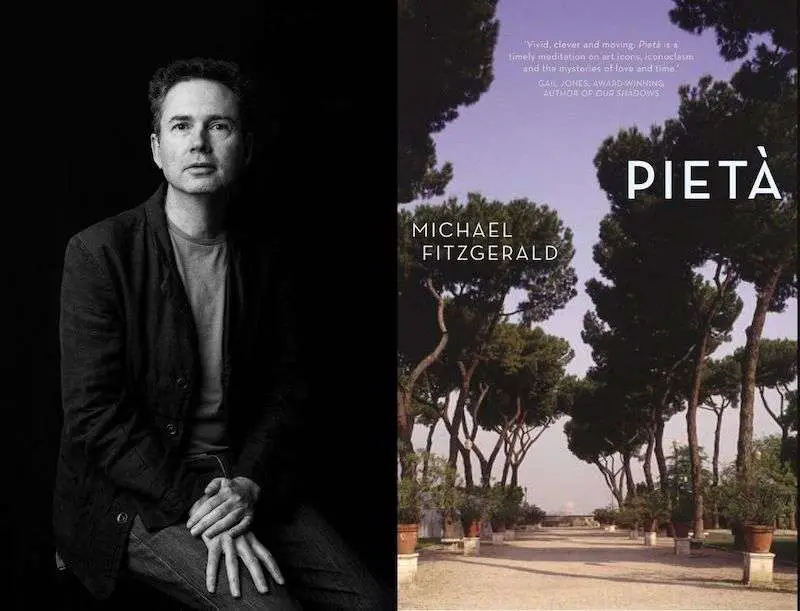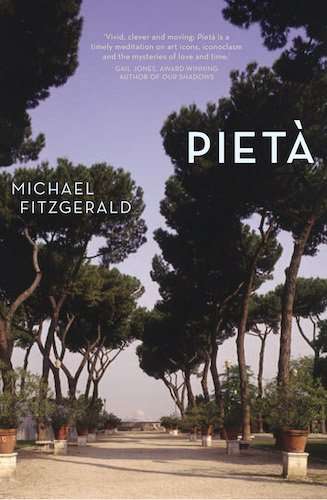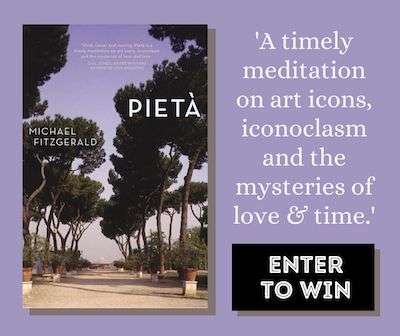Pietà: Michael Fitzgerald on his inspiration for new novel
Michael Fitzgerald joins us to discuss his inspiration for Pietà, his new literary novel about a young homesick Australian nanny set in Paris and Rome in the last days of 1999.
Plus, thanks to Transit Lounge Publishing, I have 2 ebook copies of Pietà to giveaway – entries open to Australian/New Zealand residents.

Disclosure: If you click a link in this post and make a purchase, I may earn a small commission.
Michael Fitzgerald on his inspiration for Pietà
Like my novel, Pietà began in that strange no-man’s-land as the world watched and waited for the clock to tick over from one century to the next – from 1999 to 2000. We were gripped by an almost irrational anxiety then, haunted by the prospect of computer systems crashing and planes falling out of the sky, drip-fed by the fear of the Y2K bug. Would life as we knew it be forever changed?
In 1999 I was also filled with hope. In Australia, there was talk of us becoming a republic and reconciling with our Indigenous peoples. I remember listening to Madonna’s Ray of Light album and feeling a cultural preoccupation with spiritual questioning and personal healing. Twenty-two years later, it seems but a dream.
For my guide or avatar through this recent landscape, I turned to the previous turn of the century, and inspiration from Henry James’s great role models Daisy Miller and Isabel Archer, when the New World rubbed up so startlingly against the Old. I loved the way, in James’s hands, Europe became a backdrop and rite of passage for these rogue spirits, sending their flaws and foibles into comic and tragic relief. In this way, I see Lucy Bass – an au pair from Canberra with an obsession with Madonna and a dalliance with kabbalah – as a Generation X version of Daisy or Isabel, albeit with an Australian accent.
Sometimes from a distance, whether geographically or through time, we can see ourselves with greater clarity and depth.
And so through Lucy I began to explore not only her own uncertain relationship with her late mother Jude (told in flashes through Jude’s diary which Lucy takes with her to Europe), but also a deeper cultural inheritance. In the 1990s, Australia was beginning to question its accepted histories and identity – with the growing appreciation of Aboriginal art (ironically championed by museums in Europe), and also a new understanding of the early French voyages to Australia and their pioneering interest in indigenous flora and fauna.
In Pietà, this becomes encapsulated by the Duvall family who take in Lucy at Saint-Cloud on the outskirts of Paris. Jean-Claude runs tours at the local château Malmaison, where Empress Joséphine cultivated an Australian garden, while his wife Mathilde is researching her doctorate on Aboriginal desert painting; their baby Felix was conceived in its fine red dust. At Saint-Cloud, the New World once again brushes up against the Old, with Australia elusively close yet faraway.
And so I started to see in Pietà not only Lucy’s coming of age, but also Australia’s.
I wanted to capture that moment in life – personally or culturally – when we feel the sudden weight of responsibility, to stand up for who we are: do we bend, grow or break? And if we break, can we (in the ancient thinking of kabbalah) put back the pieces and become whole again?
This idea of restoration – of putting back the pieces – runs as a leitmotif through Pietà and is embodied most explicitly by Michelangelo’s famous sculpture in St Peter’s Basilica in Rome which inspired the title of my book. I can remember seeing the work on my first trip to Europe in the mid-1980s as a fine arts student and being haunted by its history – sheltered as it was behind bullet-proof glass – and being inspired by its beauty and strength. In May 1972, a crazed Hungarian-Australian attacked the marble with a hammer, shattering this potent symbol of the ‘Blessed Mother’. Its subsequent resurrection through the hands of conservators unfolds as a quiet subplot in Pietà. And so my early inspiration comes full circle. Only through Michelangelo’s artwork can Lucy finally see her mother – and herself – more clearly. Only through art can we come together.
Pietà Synopsis

‘Vivid, clever and moving: Pietà is a timely meditation on art icons, iconoclasm and the mysteries of love and time.’ Gail Jones, award-winning author of Our Shadows
These are the last days of 1999. At St Peter’s Basilica in Rome, as the world waits for the new millennium, Lucy, a young Australian woman looks up at Michelangelo’s Pietà behind its pane of bullet-proof glass; a red kabbalah string circles her wrist. She has come with the mysterious parcel her recently deceased mother asked her to bring to the box marked POSTE VATICANE.
But before Rome there is Saint-Cloud. Here, on the outskirts of Paris, Lucy works as an au pair for Jean-Claude and his wife Mathilde. When Mathilde leaves for Central Australia to research the Aboriginal artist Kumanjayi, Lucy’s circle of contacts becomes smaller and strangely intimate: Jean-Claude, the baby Felix for whom she cares, and the couple’s charismatic friend Sébastien, a marble restorer. Yet Lucy’s homesickness for Australia and its vastness haunts her world, surfacing in the memories of her mother, the Australian garden at Empress Joséphine’s Malmaison, and Mathilde’s letters from Alice Springs.
Lucy’s mother, Jude, who was a nun in the 1970s, once warned her daughter ‘to be careful what she wished for’. It is a caution that marks but rarely alters the choices these characters make. With lushness and tenderness, and revelation, Fitzgerald’s unforgettable novel Pietà exquisitely captures the glorious and imperfect relationships between parents and children, between art and life.
(Transit Lounge Publishing, June 2021)
Get your copy of Pietà from:
More intriguing literary fiction:
Michael Fitzgerald on The Pacific Room / Night Blue by Angela O’Keefe / As Swallows Fly by LP McMahon / The Fifth Season by Philip Salom / The Price of Two Sparrows by Christy Collins
About the Author, Michael Fitzgerald
Michael Fitzgerald has lived between Sydney and Canberra as the editor of Art Monthly Australasia magazine since 2014. He made his literary debut in 2017 with The Pacific Room, a fictional speculation on Robert Louis Stevenson’s travels through Oceania. Pietà is his second novel.
Pietà eBook Giveaway

We have 2 ebook copies of Pietà to giveaway. Entries open to Australian / New Zealand residents only and close midnight 23 June 2021.
See entry form below. Ensure you scroll to the bottom of this form and press submit to register your entry. You can improve your chance of winning by:
- retweeting this Tweet (+2 entries)
- sharing this Pin with your followers on Pinterest (+3 entries); and
- sharing this Facebook post (incl. link) with your Facebook followers (+4 entries)
The lucky winners will be randomly selected and announced on our Facebook Page.
SORRY, ENTRIES CLOSED – See winners announcement.
